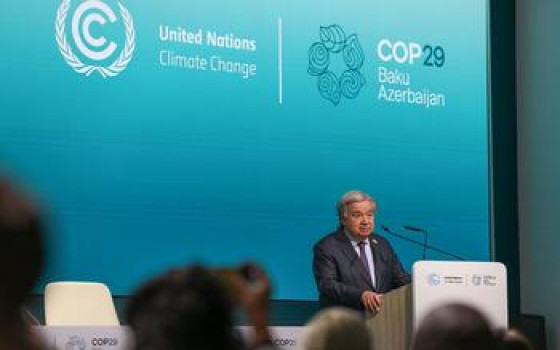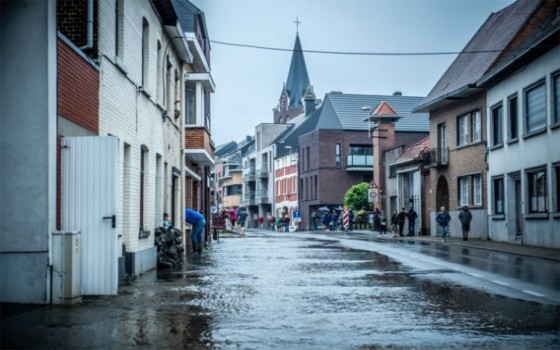
UN Secretary-General calls on climate conference negotiators to abandon tough positions, stresses that failure is not an option.. Revealing the most prominent points of disagreement

- Europe and Arabs
- Friday , 22 November 2024 9:23 AM GMT
Baku: Europe and Arabs
UN Secretary-General Antonio Guterres urged ministers and negotiators gathered at the 29th United Nations Climate Conference (COP29) to abandon rigid positions, seek compromises, and focus on the bigger picture, adding, "Don't forget what's at stake." According to the UN daily news bulletin, a copy of which we received this Friday morning,
Speaking to reporters after arriving in Baku, which is hosting the conference, coming from Brazil, where he participated in the G20 summit, Guterres said that he feels there is a desire to agree, but "there are still many fundamental differences." He warned that success is not yet guaranteed, adding, "We need a strong push to complete the discussions on the finish line. To present an ambitious and balanced package on all outstanding issues, with a new financing goal at its heart."
Guterres stressed that "failure is not an option," and could jeopardize both short-term action and the ambition to prepare new national climate action plans, with potentially devastating effects as irreversible tipping points approach. "Failure will certainly make the success of the 30th climate conference in Brazil (COP30) even more difficult," he added.
Investing against destruction
The UN Secretary-General said that a new ambitious agreement on climate finance is needed in Baku, in the context of a balanced set of decisions, adding that "this goal must mobilize the financing that developing countries need, because increasing financing is essential."
He stressed that the success of the conference enhances confidence among countries, and that international cooperation - focused on the Paris climate agreement - is indispensable for climate action. He stressed the importance of international cooperation to address climate challenges.
Guterres said that "amid geopolitical divisions and uncertainty, the world needs countries to come together here in Baku." He stressed that this climate conference seeks to achieve justice in the face of climate catastrophe, to help move closer to securing a decent world for all humanity, warning that "this is not a zero-sum game."
He said: "Finance is not just charity. It is an investment against the destruction that uncontrolled climate chaos will inflict on us all. It is a down payment on a safer and more prosperous future for every country on Earth." The Secretary-General called on all parties to step up, accelerate action and deliver on promises, adding that “the need is urgent. The rewards are great. Time is short.”
As the intense, round-the-clock climate talks at the 29th United Nations Conference on Climate Change (COP29) enter their final phase in Baku, delegates are eagerly awaiting updates on the progress of negotiations on a new climate finance target. Meanwhile, high-level discussions have also continued, focusing on key issues such as urbanization, transport and tourism.
A key sticking point in the negotiations over the past eight days has been where the hundreds of billions – or perhaps trillions – of dollars that developing countries say they need to adapt to a rapidly warming climate will come from: from rich-country governments, multilateral banks or the private sector?
Meanwhile, beyond the negotiations, the urgent need to reduce emissions, adapt to a changing climate, mitigate the impacts of the crisis, and protect people from catastrophic weather events are among the topics addressed in many speeches by government officials, heads of UN agencies, climate experts, and civil society leaders.
Half the world’s population lives in cities, and an additional 2.4 billion people are expected to move to urban areas within the next 20 years. Cities contribute significantly to global emissions and are disproportionately affected by the impacts of climate change.
In its latest report on the world’s cities, the United Nations Human Settlements Programme, the UN agency that deals with human settlements and sustainable urban development, says that billions of people currently living in cities could experience an additional temperature rise of at least 0.5 degrees Celsius by 2040.
At the same time, measures to offset the impact of climate change on urban populations are still not commensurate with the scale and severity of the challenges facing cities. Rapid and unplanned urban development poses threats to biodiversity, the environment and food security, warned Annacludia Rossbach, Executive Director of the Programme, in a speech at the ministerial meeting of the Climate Conference.
It also leads to social fragmentation and financial deterioration. While the construction sector accounts for 40 per cent of greenhouse gas emissions, the Programme Director said that 96 houses need to be built every day to achieve the Sustainable Development Goals by 2030.
Adequate financing and cooperation at all levels are therefore essential to address these twin challenges. “There is only one path to follow, one path that we take together where social, urban and climate needs are met in harmony on a solid economic footing,” Ms Rossbach stressed.
“Yes, we need more finance flowing to cities. We need to plan and prioritise. Land is scarce and needs to fulfil its social and environmental functions. The social and housing needs are enormous,” she added. “We take care of people, and people take care of the planet. We should leave no one behind,” she said.












No Comments Found